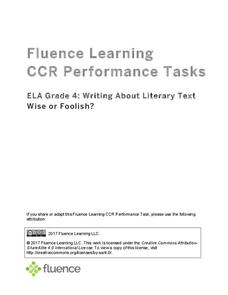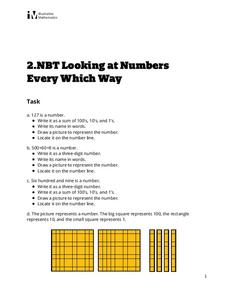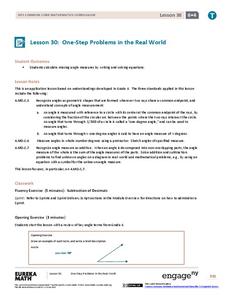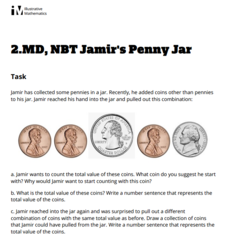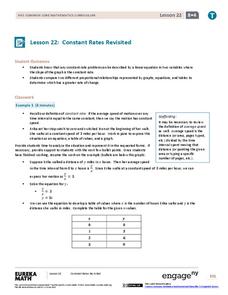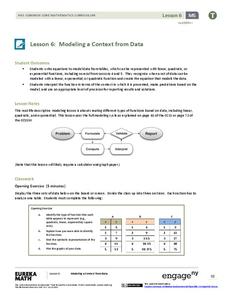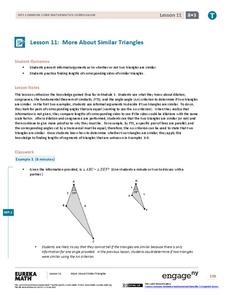Fluence Learning
Writing About Literary Text: Wise or Foolish?
A three-part assessment promotes reading comprehension skills. Class members read literary texts and take notes to discuss their findings, answer comprehension questions, write summaries, and complete charts.
EngageNY
When Can We Reverse a Transformation? 3
When working with matrix multiplication, it all comes back around. The 31st portion of the unit is the third lesson on inverse matrices. The resource reviews the concepts of inverses and how to find them from the previous two lessons....
EngageNY
End-of-Module Assessment Task: Grade 8 Module 5
Give your class a chance to show how much they've learned in the module with an end-of-module assessment task that covers all topics from the module including linear and non-linear functions and volumes of cones, cylinders, and...
EngageNY
Mid-Module Assessment Task: Grade 6 Math Module 4
Halfway through the module — the perfect time for an assessment. The 18th installment of a 36-part series is a mid-module assessment. Scholars provide evidence of understanding through various mathematical and contextual problems.
EngageNY
An Appearance of Complex Numbers 2
Help the class visualize operations with complex numbers with a instructional activity that formally introduces complex numbers and reviews the visualization of complex numbers on the complex plane. The fifth installment of a...
EngageNY
End-of-Module Assessment Task - Geometry (module 3)
It's test time! Determine your class's understanding of the topics of volume and cross sections with a thorough assessment on volume, area, and geometric shapes.
Illustrative Mathematics
Looking at Numbers Every Which Way
Assess class members' ability to look at numbers every which way. A helpful activity contain four tasks, including writing numbers as a sum of 100's, 10's, and 1's, and drawing a picture to represent the number.
EngageNY
Exploiting the Connection to Trigonometry 2
The class checks to see if the formula for finding powers of a complex number works to find the roots too. Pupils review the previous day's work and graph on the polar grid. The discussion leads the class to think about...
EngageNY
Interpreting Division of a Fraction by a Whole Number—Visual Models
Divide fractions just like a model does. Pupils visualize the division of a fraction by a whole number by creating models. Scholars make the connection between dividing by a whole number and multiplication before practicing the skill...
EngageNY
One-Step Problems in the Real World
Mirror, mirror on the wall, which is the fairest resource of them all? Individuals write and solve one-step equations for problems about angle measurement, including those involving mirrors. Both mathematical and real-world problems are...
Illustrative Mathematics
Jamir's Penny Jar
Before you start counting the coins in Jamir's coin jar, figure out which coin to start with. Should it be the penny or the quarter? Why? This is the focus around a worksheet that works well as an assessment on counting money and...
EngageNY
End-of-Module Assessment Task: Grade 8 Module 4
Connect proportional linear equations and systems. The seven-question assessment is the last installment in a 33-part series. The items cover comparing proportional relationships, slope concepts, and simultaneous linear...
EngageNY
Constant Rates Revisited
Find the faster rate. The resource tasks the class to compare proportional relationships represented in different ways. Pupils find the slope of the proportional relationships to determine the constant rates. They then analyze the...
EngageNY
Mid-Module Assessment Task: Grade 6 Math Module 2
Make sure scholars know all about fractions and decimals — not just a fraction of the information. The 12th installment of a 21-part series is a mid-module assessment. Learners solve problems in the context of a birthday party and a...
EngageNY
An Appearance of Complex Numbers 1
Complex solutions are not always simple to find. In the fourth lesson plan of the unit, the class extends their understanding of complex numbers in order to solve and check the solutions to a rational equation presented in the first...
EngageNY
End-of-Module Assessment Task: Grade 6 Math Module 3
The last installment of a 21-part module is an end-of-module assessment. Individuals show their understanding of positive and negative numbers on the number line, absolute value, and the coordinate plane in a variety of contexts.
EngageNY
Rational Numbers on the Number Line
Individuals learn how to plot rational numbers on the number line in the sixth lesson of a 21-part module. They identify appropriate units and determine opposites of rational numbers.
EngageNY
Mid-Module Assessment Task: Pre-Calculus Module 2
Assess your classes' knowledge using questions that require high-level thinking and explanation. Learners use matrices to answer application questions. They also demonstrate their understanding of matrix operations.
EngageNY
Complex Numbers as Vectors
Show your math class how to use vectors in adding complex numbers. Vectors represent complex numbers as opposed to points in the coordinate plane. The class uses the geometric representation to add and subtract complex numbers and...
Illustrative Mathematics
Crude Oil and Gas Mileage
Here is an activity that presents a real-world problem about the relationship between crude oil production and the gas mileage of modern automobiles. After learners write functions to describe the relationships, they are asked to...
EngageNY
The Opposite of a Number's Opposite
It's said that opposites attract, but what about opposites of opposites? Individuals learn about the opposite of opposites using number lines. They complete a group activity in which members determine the opposite of opposites of...
EngageNY
Modeling a Context from Data (part 2)
Forgive me, I regress. Building upon previous modeling activities, the class examines models using the regression function on a graphing calculator. They use the modeling process to interpret the context and to make predictions...
EngageNY
Modeling a Context from Data (part 1)
While creating models from data, pupils make decisions about precision. Exercises are provided that require linear, quadratic, or exponential models based upon the desired precision.
EngageNY
More About Similar Triangles
Determine whether two triangles are similar. The lesson presents opportunities for pupils to find the criterion needed to show that two triangles are similar. Scholars use the definition of similarity to find any missing side...
